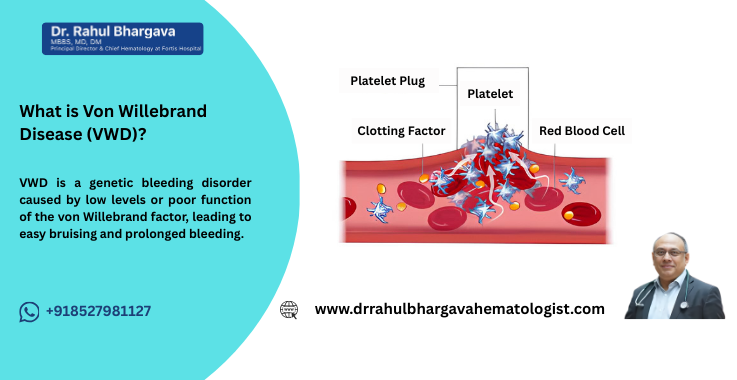Von Willebrand Disease Treatment in India

Von Willebrand Disease (vWD) is the most common inherited bleeding disorder caused by a deficiency or dysfunction of von Willebrand factor (vWF), a protein essential for blood clotting. vWF helps platelets adhere to the site of a blood vessel injury and facilitates the binding of factor VIII, another important clotting protein. Without adequate vWF, individuals with von Willebrand disease may have difficulty forming blood clots, leading to prolonged or excessive bleeding after injury or surgery.
What is Von Willebrand Disease?
Von Willebrand Disease (VWD) is a genetic bleeding disorder that affects the blood’s ability to clot. Unlike hemophilia, which primarily affects males, VWD can affect both men and women. It results from a deficiency or dysfunction of the von Willebrand factor, which helps blood cells stick together and form clots. Without enough functional VWF, clotting is impaired, leading to excessive bleeding.
Causes:
VWD is primarily inherited from one or both parents. A gene mutation affects the production or function of the von Willebrand factor. Although rare, it can also occur due to autoimmune diseases or as a result of certain medications, leading to acquired VWD.
Types of Von Willebrand Disease:
VWD has three main types:
- Type 1: The most common and mildest form, where the von Willebrand factor is lower than normal.
- Type 2: The von Willebrand factor produced is defective and does not function properly. There are four subtypes within this type (2A, 2B, 2M, 2N).
- Type 3: The most severe form, where the patient has little to no von Willebrand factor.
Symptoms of Von Willebrand Disease
Symptoms can range from mild to severe, depending on the type of VWD. Common symptoms include:
- Frequent nosebleeds
- Easy bruising
- Heavy menstrual bleeding in women
- Prolonged bleeding after injuries, surgeries, or dental work
- Blood in urine or stools
In severe cases (Type 3), spontaneous bleeding into joints and muscles can occur, similar to hemophilia.
Diagnosis of Von Willebrand Disease
Diagnosing VWD requires a thorough evaluation, including:
- Blood tests: To measure von Willebrand factor levels, clotting activity, and factor VIII levels.
- Bleeding history: Understanding any family history of bleeding disorders can help in diagnosing VWD.
- Advanced laboratory tests: Genetic testing may be recommended in specific cases.
Treatment Options for Von Willebrand Disease
Treatment for VWD depends on the severity and type of the disease. Common treatments include:
- Desmopressin (DDAVP): This synthetic hormone stimulates the release of stored von Willebrand factor in mild cases.
- Replacement therapies: For more severe cases, von Willebrand factor concentrates can be infused to replace the missing or dysfunctional factor.
- Antifibrinolytic medications: These drugs prevent the breakdown of clots, helping control bleeding.
Hormonal therapy: Women with heavy menstrual bleeding may benefit from birth control pills or other hormonal treatments to reduce bleeding.
Cost of Treatment and Stay in India
The cost of treating Von Willebrand Disease (VWD) in India is significantly more affordable compared to many other countries, while maintaining high standards of medical care. The expenses depend on the severity of the disease, the type of treatment required, and the healthcare facility. Here’s an overview of the costs:
-
Initial Consultation:
USD: $30 – $100
INR: ₹2,200 – ₹7,400 -
Diagnostic Tests (Blood tests, factor assays, genetic testing):
USD: $100 – $300
INR: ₹7,400 – ₹22,200 -
Desmopressin (DDAVP) Therapy (per dose):
USD: $50 – $150
INR: ₹3,700 – ₹11,100 -
Von Willebrand Factor Concentrate Infusion (per session):
USD: $300 – $1,500
INR: ₹22,200 – ₹1,11,000 -
Antifibrinolytic Medications (per month):
USD: $50 – $200
INR: ₹3,700 – ₹14,800 -
Hospital Stay (if required, per night):
USD: $25 – $200
INR: ₹2,000 – ₹15,000
India is a preferred destination for managing Von Willebrand Disease due to its advanced healthcare infrastructure and cost-effective treatment options. Patients can benefit from comprehensive care at a fraction of the cost compared to Western nations.
Frequently Asked Questions
There is no cure for VWD, but it can be managed effectively with proper treatment.
Avoid blood-thinning medications like aspirin, and consult your doctor for personalized advice on managing injuries and surgeries.
Yes, women with VWD can have children, but it’s essential to work closely with a hematologist and obstetrician to manage bleeding risks during pregnancy and childbirth.
While both are bleeding disorders, VWD affects the von Willebrand factor, whereas hemophilia primarily involves clotting factors like factor VIII or IX. VWD also affects both genders, while hemophilia mainly affects males.